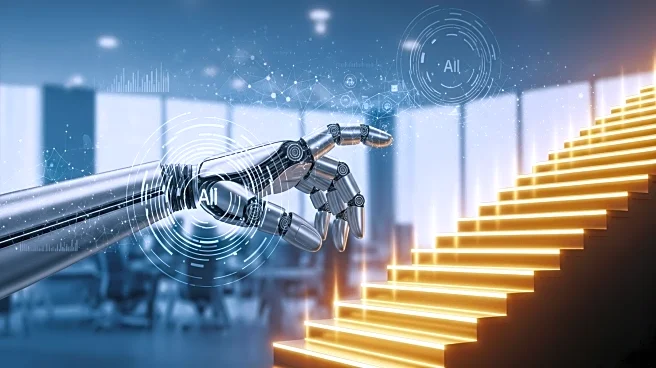What's Happening?
The rise of artificial intelligence (AI) is significantly altering the landscape of entry-level jobs and career progression within U.S. corporations. Notable figures such as Antonio Neri, Doug McMillon, and Mary Barra exemplify the traditional career ladder, starting from entry-level positions and rising to CEO roles. However, AI advancements are predicted to eliminate up to 50% of entry-level jobs, according to Anthropic CEO Dario Amodei. This shift is causing organizational flattening, particularly in middle management, and raising concerns about the future of career advancement. A study by SignalFire indicates a 50% decline in new role starts for individuals with less than one year of post-graduate experience across various business functions. Despite these challenges, experts like Heather Doshay suggest that the evolution of entry-level roles could lead to more advanced positions, requiring new graduates to acquire skills independently.
Why It's Important?
The potential reduction in entry-level jobs due to AI poses significant implications for the U.S. workforce, particularly for recent graduates. The traditional career ladder, which has been a cornerstone of corporate America, may be disrupted, affecting the transfer of institutional knowledge and upward mobility. This shift could lead to a more competitive job market, where new graduates must possess advanced skills to secure positions. Additionally, the flattening of organizational structures may alter how companies develop talent internally, potentially reshaping corporate culture and employee development strategies. The broader impact on employment rates and economic stability remains uncertain, as historical technological advancements have shown varied effects on job markets.
What's Next?
As AI continues to evolve, companies and educational institutions are likely to adapt by offering training programs and partnerships to equip graduates with necessary skills. Universities are increasingly becoming AI training grounds, collaborating with companies like Anthropic and OpenAI. Businesses may need to address the gender gap in AI adoption and ensure equitable access to training. The long-term effects of AI on corporate structures and employment will unfold over time, requiring ongoing adjustments and strategic planning by organizations.
Beyond the Headlines
The ethical and societal implications of AI replacing entry-level jobs are profound. The concentration of wealth and power among those controlling AI technologies could exacerbate economic inequalities. Furthermore, the potential for AI to achieve superintelligence raises questions about the future of human employment and the stability of corporate hierarchies. Ensuring that AI advancements benefit the broader workforce and do not lead to job displacement is a critical challenge for policymakers and business leaders.









